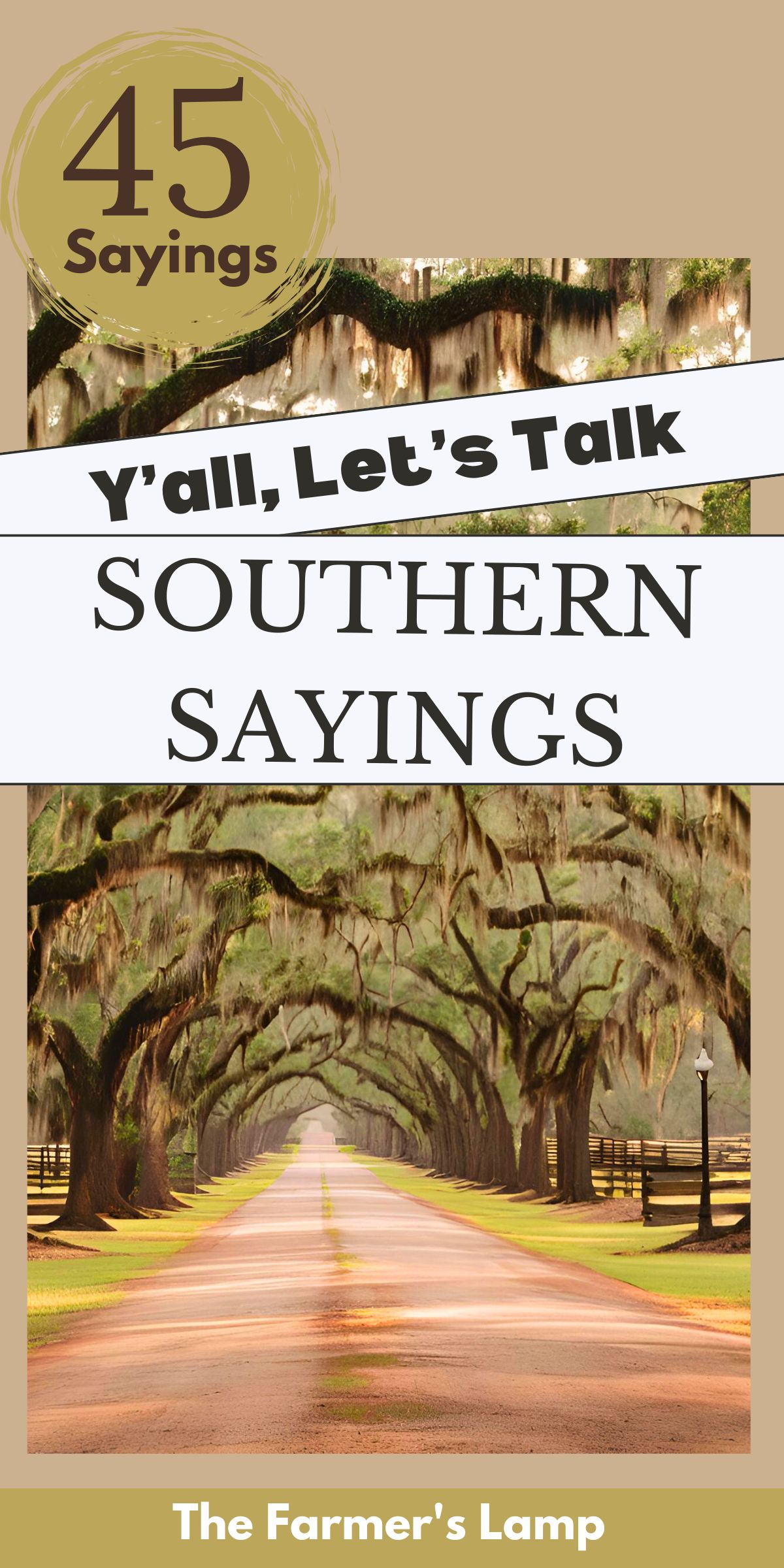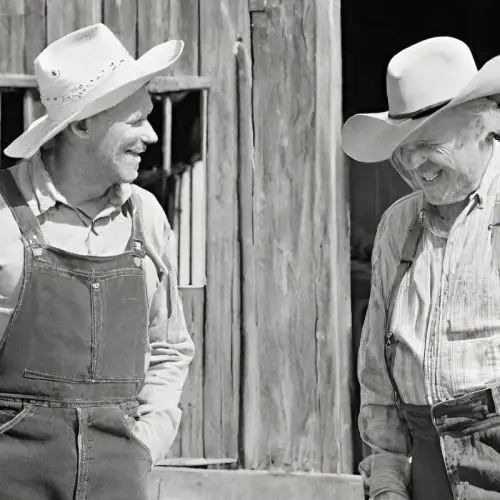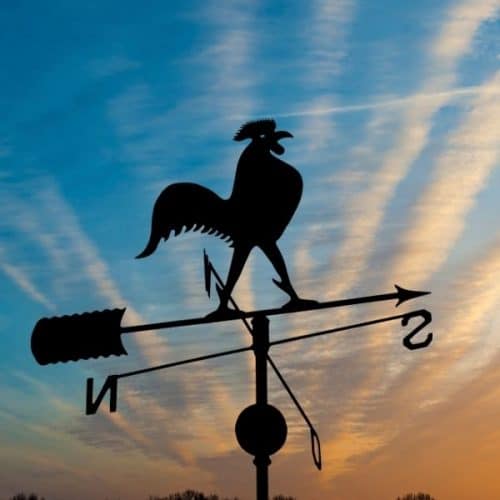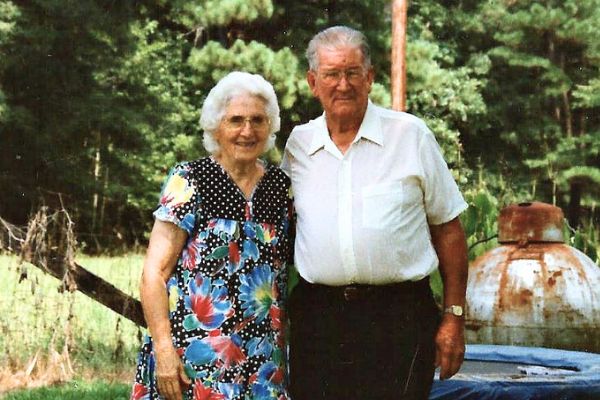Here in the South, where the sweet tea is always cold, and the Southern sayings are as warm as a well-worn quilt, we’ve got a way with words that can sometimes baffle those not from around these parts. Our heritage runs as deep as the Mississippi River, with expressions that weave through our conversation like kudzu vines. It’s always a treat to hear folks from other places try their hand at pronouncing towns like Natchitoches or Shuqualak or even attempt to mimic our Southern drawl. We love a good laugh, especially at ourselves, and nothing’s better than sharing Southern sayin’s that make our language as savory as our food. So pull up a chair, and let’s dig into some phrases that spice up our Southern speech.

Meanings of Southern Sayings (So You Can Understand Us)
Watch The Video For Southern Sayings
Bless Your Heart
Perhaps the most quintessential and widely recognized of our Southern sayings, “Bless your heart,” carries a depth of meaning that outsiders often miss. It’s one of those phrases that can be as sweet as honey or sharp as a thorn, depending on how it’s used. The key to understanding this phrase lies not in the words themselves but in the inflection and stress placed on particular words. The way it’s spoken offers clarity and insight into the true intent behind it. Here are the three primary ways it’s typically employed:
- Genuine Compassion: At its most sincere, “Bless your heart” is a heartfelt expression of sympathy or concern. When spoken softly, emphasizing “heart,” it conveys warmth and understanding, much like saying, “I’m sorry you’re going through this,” with a Southern twist.
- Polite Condescension: More often, “Bless your heart” is used to gently point out someone’s foolishness or naiveté without being overtly harsh. A slight stress on “bless” can soften the critique, making it a way to acknowledge that someone’s actions or words might not be the wisest. It’s like saying, “Well, your ignorance is showing, but I won’t point it out to you,” with a kindly smile.
- Veiled Insult: Finally, “Bless your heart” can also carry a bit of Southern shade. When delivered with a drawn-out, almost syrupy tone, it’s a subtle but pointed way to express disdain or disapproval. In this context, it’s the polite Southerner’s way of saying, “You poor thing, you don’t know any better, and since you won’t accept the truth or help, I’ll let you go your way,” but with a smile that doesn’t quite reach the eyes.
Understanding these nuances, especially how the phrase is delivered, is key to grasping the versatility and charm of “Bless your heart.” Whether spoken with genuine concern, gentle correction, or a touch of sass, it’s a saying that’s as layered as the South itself.
Words of Wisdom
- Don’t count your chickens before they hatch: A reminder not to plan for something until you’re sure it’s going to happen—like waiting to see those eggs hatch.
- Even a blind hog finds an acorn every now and then: Even those who aren’t particularly skilled or capable can occasionally stumble upon success or be right purely by chance.
- Lord willing and the creek don’t rise: something will happen as long as everything goes as planned and no unforeseen obstacles arise, acknowledging that circumstances beyond our control might interfere.
- You can’t make a silk purse out of a sow’s ear: reminds us that some things just can’t be changed, no matter how hard you try. Some things are what they are, and no amount of dressing them up can alter their true nature.
- To cast pearls before swine: Giving something valuable to someone who can’t appreciate it or won’t receive help from it. It comes from the Holy Bible, words of advice from Jesus Christ.
- A Rooster One Day and a Feather Duster the Next: Highlights the unpredictable nature of life, where someone might be on top one day, full of pride and importance like a strutting rooster, and then find themselves knocked down or insignificant the next. It’s a reminder of how quickly fortunes can change and the fleeting nature of success or status.
Grit and Gumption
- Bite off more than you can chew: Taking on more responsibility or tasks than you can manage. It can also infer that you are trying to do something you lack the skills or ability to do.
- Come hell or high water: A steadfast determination to accomplish something, no matter what challenges arise. However, it can also suggest stubbornness or recklessness when pursuing a course of action despite warnings or obvious risks. It’s the kind of resolve that can either forge a path forward or lead straight into trouble, depending on the situation.
- When pigs fly: Something that seems impossible or very unlikely to happen.
- Hold your horses: Slow down, wait a minute before deciding or running off to do something, and be patient.
- They’ve got gumption: Gumption is the blend of courage, initiative, and resourcefulness. It embodies the spirit to tackle challenges head-on, often with a mix of boldness and clever problem-solving. Gumption isn’t just about bravery; it’s about having the common sense and drive to get things done, even in challenging or uncertain situations.
Dash of Southern Oddity
- Cattywampus: Often used to describe something askew, crooked, or not properly aligned. It’s when things aren’t quite straight, like a picture hung at a tilt or a fence blown slightly off-kilter by the wind.
- Plumb: A versatile word in Southern sayings used to enhance the degree of the expression. For instance, if someone is “plumb tuckered out,” they’re not just tired but utterly exhausted. Similarly, “he was plumb mad” indicates he was not just angry but exceptionally so. It’s a way to intensify feelings or states to emphasize their full extent.
- As dumb as a sack of hammers: Not very smart or lacking common sense.
- From can to can’t: Working from the first light of dawn (“can see”) to the fall of dusk (“can’t see”), representing a full day’s labor. It describes working as hard and as long as physically possible.
- Blind in one eye and can’t see out of the other: Someone who is significantly ignorant or unaware, missing details and almost entirely oblivious to what’s happening around them. The term is often used humorously to highlight someone’s total lack of perception or refusal to acknowledge the obvious.
- If it was a snake, it would’ve bit me: Said when something is in plain sight but still not noticed.

Southern Sayings of Emotion and Behavior
- As snug as a bug in a rug: Being comfortably settled, it’s often used to describe feeling perfectly cozy and secure in one’s surroundings.
- Bless your pea-pickin’ heart: While it may sound sweet, this expression is typically used to comment on someone’s foolishness or naiveté. It softly highlights someone’s ignorance or misguided behavior without being overtly harsh.
- Happy as a pig in a sty: Someone thoroughly enjoying their current situation, no matter how messy or imperfect it might seem to others. It’s about finding joy where you are. there are a few versions of this saying, such as “happy as a pig in mud” or “happy as a pig in a wallow.”
- Pot callin’ the kettle black: Criticizing someone for a fault one also has.
- Being ugly: “Being ugly” doesn’t refer to physical appearance but to someone’s behavior or demeanor. It describes actions or words that are mean-spirited, harsh, or unnecessarily unkind. It’s used to call out or critique someone’s unpleasant behavior straightforwardly, indicating that they are acting in a way that is morally or socially unappealing.
- Don’t let the screen door hit you in the backside on the way out: This phrase can be both humorous and pointed. It is used to tell someone to leave without expecting to be asked to stay. It implies that their departure is more than welcome, often conveying the message that the speaker is done with the person or conversation. Whether used in jest or with a sharper tone, it signals that it’s time for the person to go, and they won’t be missed.
- He’s too big for his britches: Someone acting more important than they really are or overconfident.
Everyday Talk
- Y’all: More than just a contraction of “you all,” this quintessentially Southern term is a friendly and inclusive way of addressing any audience, whether a single person or a group. It’s used in casual conversation and formal addresses, making it a versatile and essential part of Southern vocabulary.
- Fixin’ to: Getting ready or about to do something.
- Reckon: Express thinking or supposing something, but it’s also commonly employed to affirm or conclude a statement. It can imply agreement or acknowledgment, as in agreeing with someone or concluding a discussion with an assertion, such as “I reckon that’s all for today,” indicating that something is finished or decided upon.
- Let me let you go: A polite way of ending a conversation or visit.
- It’ll all come out in the wash: Everything will resolve itself eventually. In the context of friendships, it implies that there’s no need to worry about keeping score because, in the end, things will balance out naturally, just like laundry coming out clean after a wash.
- Between you, me, and the fence post: This is confidential, just between us. Implies that the conversation should be kept secret.
Humorous and Quirky
- Uglier than homemade sin: Extremely unattractive or unpleasant. I’m not exactly sure what homemade sin is, but it must be really bad.
- Nervous as a cat in a room full of rocking chairs: Extremely jittery or anxious in a particular situation or event.
- Looks like he (or she) fell out of the ugly tree and hit every branch on the way down: Used humorously to describe someone as being extremely ugly, suggesting they encountered every possible misfortune in the looks department as if hitting every branch of an “ugly tree.” It’s a colorful and exaggerated way to comment on someone’s appearance, often used in a jesting tone among friends, never to someone’s face. That would be just rude!
- The devil is beating his wife: A sunshower, where it’s raining while the sun is shining. I have no idea of the origins of this southern saying, but I bet it’s a doozie of a story!
More Southern Gems
- Full as a tick: So full of food, you can’t eat another bite. If you’ve ever seen a full tick on a dog, you would know it means about to burst.
- Scarce as hen’s teeth: Extremely rare or hard to find since chickens don’t have teeth.
- Caught between the devil and the deep blue sea: Stuck between two terrible options.
- That dog’ll hunt: That idea or plan is a good one.
- Kick the bucket: A light-hearted way of saying someone has died.
- It’s as hot as all get out: Scorching weather.
- It’s hotter than blue blazes: Another way to describe the intense heat of the Deep South mixed with our high humidity.
- Til the cows come home: Something taking a long time, as long as it would take cows to wander back.
- Hog-killin’ weather: Very cold weather, which only lasts a few days in the South, is good for butchering as it preserves meat better.
- Hook, line, and sinker: To fall for something entirely, especially a trick or deception.
Wrap UP
These Southern sayings offer a taste of the rich heritage that shapes our conversations and lives. They remind us of the humor, wisdom, and resilience woven into the Deep South fabric of life. As you go about your day, maybe one of these phrases will come to mind and bring a smile or a moment of reflection. We embrace the quirks and charm that make our way of life so special. Here’s to the stories and sayings that keep our traditions alive, passing down a little piece of Southern soul with every word.





Thank you for sharing these. Several of them I knew from my youth even though I don’t expect Southern California can be considered ‘The South”. : ) A couple I heard in a slightly different form: “even a blind squirrel finds a nut once in a while”, and a reference to someone being so angry they were “pig-biting mad”. Conjures up an interesting image. In Terry Pratchett’s Discworld stories, Lord Vetinari often dismisses people by saying “Do not let me detain you.” “The devil is beating his wife” reminded me that my Dad said one time when he was young, he looked out the window and saw it was pouring rain on one side of the street while the other side had sunshine. “It will all come out in the wash” reminded me of when I’d help my Gramma with her laundry in her garage. We’d roll the washer out into the middle, plug it into the wall outlet, load the clothes and soap, fill it with a hose from the sink, and let it do it’s thing for a bit. Then we’d set up a basket on the other side of the wringers, change the belt from the tub to the wringers, then start feeding clothes through to squeeze out the water. When we finished, we drained the tub, took the basket outside, shook out the clothes and hung them up on the lines. Good memories. I recently saw a cartoon where two people are standing next to clotheslines of clothes and one is saying “My drier uses a combination of solar and wind power”. You have a habit of jogging my memory, and that makes my life more pleasant. Thank you.
Steve, Thank you for sharing your memories with us. They are always interesting and we love hearing them. I love the cartoon caption! Thank you for being such a loyal member of TFL Community. Your support means a great deal to us.